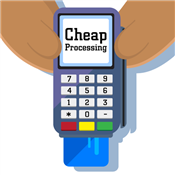Credit Card Convenience Fee
A credit card convenience fee or a surcharge is a way for merchants to offset pricey processing fees. But there are rules. Here's everything you need to know.
 |
Credit card processing fees eat into your bottom line. You may be wondering if it's okay to pass those costs on to your customers.
The short answer is that you can, but it's not legal in all states.
There are two types of extra fees: credit card convenience fee and credit card surcharge. Merchants often get them mixed up, but they're different and have their own rules.
Stick around to learn some alternative ideas to save on processing costs, without surcharging your customers.
Credit Card Convenience Fee
A credit card convenience fee is an extra charge when the customer pays using an alternate payment method different from what the merchant usually accepts.
For example, if a local theater usually sells tickets at the box office, it may charge an extra fee for the "convenience" of buying your ticket online. Or a utility company may allow users to pay with a credit card for an extra fee (instead of the usual ACH or check).
Because the merchant doesn't normally take that payment method, they may charge a convenience fee (usually 1% - 3%) to cover the cost of processing.
Convenience fees are legal in all states, but each of the 4 credit card networks have their own rules:
- Visa: Allowed for all non-standard payment methods, except for tax payments (though some states allow).
- Mastercard: Only allowed for pre-certified government agencies and educational institutions.
- American Express: Only allowed for government agencies, educational institutions, utility companies, and rental establishments.
- Discover: No set rules, but merchants can't charge a convenience fee to Discover cardholders unless it also charges the same fee for other card issuers too.
Convenience fees are different from a credit card surcharge, which we'll go over next.
Convenience Fee vs. Credit Card Surcharge
 |
A credit card surcharge is an additional fee added to the customer's purchase for using a credit card instead of cash.
In this case, your posted price is the cash price. And if a customer uses a credit card, then they're charged a higher price.
If you plan to surcharge, you must be completely transparent. These are the rules:
- Any surcharges must be clearly displayed at checkout and communicated to the customer.
- The surcharge cannot exceed the cost of the processing fee or 4% of the transaction, whichever is lower.
- Surcharge cannot be imposed on debit or prepaid debit card transactions.
- The surcharge must be clearly stated on the receipt.
- You must notify Visa and Mastercard that you plan to surcharge.
If your state allows surcharges, it can be for any business and any credit card purchase.
This practice is legal in most states, EXCEPT for: Connecticut, Massachusetts, and Puerto Rico. But some states also have more limitations. These are: California, Florida, Kansas, Maine, New York, Oklahoma, Texas, Utah. Make sure you know your state's specific rules.
A credit card surcharge is an extra fee added when the customer uses a credit card to make a purchase. A convenience fee is charged when the customer pays with a non-standard payment method.
Why Do Businesses Charge a Credit Card Surcharge?
The main reason businesses charge a credit card surcharge is to help cover credit card processing costs.
It may be easy for a customer to pay in 3 seconds with a credit card. But it costs money for businesses to process credit card payments. Processing fees can add up to hundreds (or thousands) of dollars a month.
The average credit card processing fees are 1.5% - 2.9% for in-store swiped transactions. On a $20 purchase, that's $0.30 to $0.58 on processing fees. This could be hard on a small business with already tight margins.
By adding a small surcharge to the customer's purchase instead, it can offset pricey processing fees. This helps the business stay afloat.
Free Credit Card Processing with Surcharging
- You keep 100% of every credit card sale: when you sell $100, you receive $100. Pay only for debit card transactions.
- Fully Compliant
- CardX passes on the fee for credit card transactions only. Your customers can always choose debit as a no-fee option.
But it's not always a good idea. If you're not sure whether imposing a surcharge or convenience fee is right (or even legal) for your business, read on for some alternative options to help you save.
Alternative 1: Set a Credit Card Minimum
Tiny credit card purchases can really hurt a small business.
Say a customer wants to buy something for $2. If your average rate is 1.75% + $0.30 per transaction, that's $0.34 in processing fee on a simple $2 purchase.
If your margins are already tight, you could even lose money on tiny purchases like that.
Setting a minimum purchase amount for credit cards can help you avoid fees on small tickets. This is legal by the Dodd-Frank Act, but there is some fine print:
- The credit card minimum purchase amount can be no more than $10.
- The minimum must apply to all cards. You can't say there's a $10 minimum for Amex, but nothing for Visa.
- You cannot set a minimum purchase on debit cards.
You may lose some customers who don't usually carry cash, but it probably won't make much difference. Customers will either pay cash for small purchases, or buy more to reach the $10 minimum. Either way, it's a positive thing.
Alternative 2: Encourage Debit Card Payments
Debit cards have much lower interchange fees because of the lower risk of fraud. The typical interchange rate for debit cards is just 0.5%, while credit cards are around 1.7% - 2%.
On a $20 purchase, a debit card will cost you just $0.10, compared to $0.40 for credit cards. That's a huge difference that will definitely add up.
If you're a small local shop with a loyal customer base, you can explain to your customers that debit cards will help you stay in business. A lot of people would be happy to support their favorite stores.
Alternative 3: Offer a Cash Discount
Instead of imposing a credit card surcharge, why not offer a discount for cash?
Cash discounts are the most common at gas stations. You might see a lower price for cash payments and a higher price for credit cards. It's also common for service-type businesses, like dental offices or car repair shops.
It's legal to offer a cash discount, as long as the discount is clearly stated and offered to all customers. The posted price must be the regular price for credit cards. But you can charge a lower price for customers who pay in cash.
In other words, you can't post the lower cash price, and then charge a higher price for credit cards (then that becomes a surcharge).
Should You Charge a Convenience Fee?
Even though passing on the fees to customers will help your bottom line, should you do it?
People hate extra fees, and it could turn them off to your business. Especially if other businesses in your area don't have this practice. You could be driving customers to competitor shops.
Of course, as a small business owner, you want to save as much as possible. But building loyalty and repeat customers is more important. Think about whether saving the couple extra percentages is really worth it.
Bottom Line
Adding a credit card surcharge or convenience fee can be a way to help you save on processing fees. But think carefully whether it's the right choice for your business. Is it worth potentially annoying or losing customers?
If you do plan to add a surcharge or convenience fee, check with your legislation to make sure it's legal for your state and type of business. It's important to abide by all the rules to avoid getting into trouble.
Anna G is a research director at CreditDonkey, a credit card processing comparison and reviews website. Write to Anna G at feedback@creditdonkey.com. Follow us on Twitter and Facebook for our latest posts.
Note: This website is made possible through financial relationships with some of the products and services mentioned on this site. We may receive compensation if you shop through links in our content. You do not have to use our links, but you help support CreditDonkey if you do.
Not sure what is right for your business?
|
|
|
|
|
|








